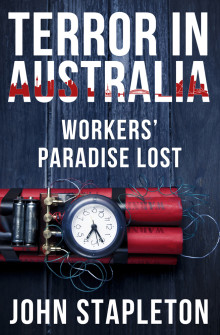Extract from Terror in Australia: Workers’ Paradise Lost.
Tuesday 25 April, 2023 is Anzac Day in Australia.
Australian governments had always appealed to nationalism in their aggressive drives to recruit young men to war. World War One posters included: “Under Which Flag Will You Live? Enlist Now”; “The Trumpet Calls”; “The Boys In The Trenches Vote Yes”; and “It Is More Serious Than You Think, The barbarian is almost at your gates, He Violates, Plunders, Murders, Don’t let him get a footing on British soil, Help To Repel The Invasion By Enlisting Now.”
Those young soldiers who had marched with such pride, such joy, from family farms and scattered townships across Australia, if they had still been alive, would not have recognised the country they had fought and died for; would have dismissed with contempt the politicians eulogising on their behalf, and would have been inconceivably grief stricken at the loss of their friends; and even, to a less formulated degree, at the loss of their own lives and loves, the children never born.
Men with their whole lives in front of them died at the behest of Generals in London; and the obsequious political class in far off Australia. Good of heart, strong of limb. They would never grow old.
Base appeals to nationalism would still be a part of the justification for war and the manipulation of public opinion a century later.
As the centre for the Anzac Day Dawn Services, every 25th of April crowds gathered in Martin Place in the hushed darkness before the dawn.
Anzac Day was originally a time for returned soldiers to remember their fallen comrades; and became a day in honour of all the country’s fallen soldiers. ANZAC was an acronym for the Australian and New Zealand Army Corps, whose soldiers were known as Anzacs.
The date marked the anniversary of the beginning of the first campaign in World War One, which led to major casualties, the attempt to capture the Gallipoli Peninsula in 1915.
The objective had been to take Constantinople, as Istanbul was then known, the capital of the Ottoman Empire, the largest Islamic empire in history. Turkey, as it came to be known, had sided with the Germans during the War; thus placing Australia, with its historical links to Britain, on the opposite side of the conflict.
Contrary to the reasonable presumption that as the majority of Australians were neither militaristic nor very nationalistic and as 20th Century wars retreated into history and Australia transposed into a multi-ethnic society, the crowds attending Anzac Day ceremonies had been growing in the years to 2015; the first signs of dawn silhouetting dense, reverential crowds, including the ancestors of those who fought and died, emotional in acknowledgment of the debt they owed their forebears.
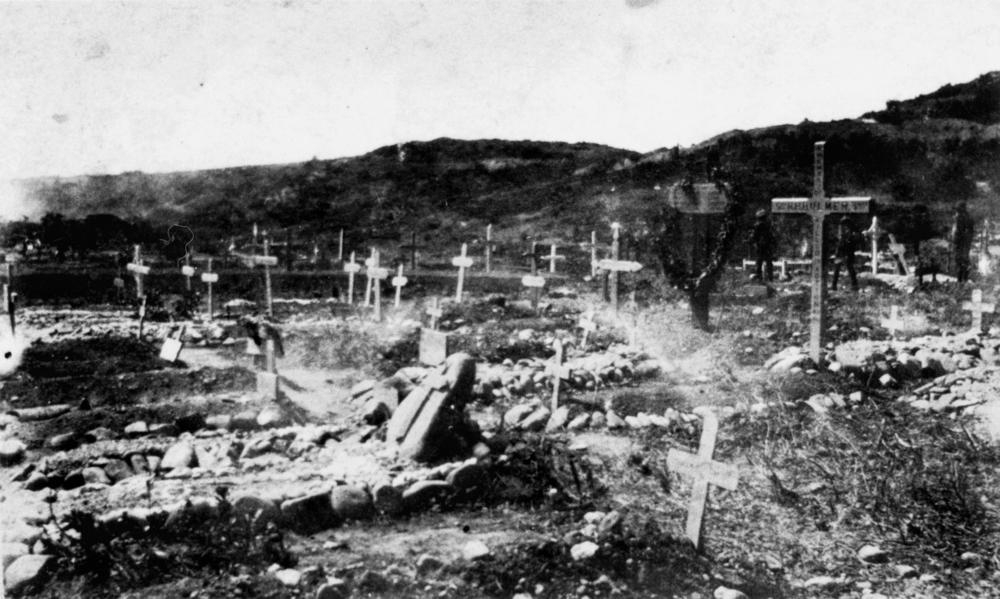
Each year the dignitaries, politicians, and the profundity of the services added import to the Anzac Day ceremonies, ensuring Martin Place remained central to the Sydney’s psyche as well as its business life.
Each year The Ode of Remembrance was heard, but only part of it was commonly read:
They went with songs to the battle, they were young.
Straight of limb, true of eyes, steady and aglow.
They were staunch to the end against odds uncounted,
They fell with their faces to the foe.
They shall grow not old, as we that are left grow old:
Age shall not weary them, nor the years condemn.
At the going down of the sun and in the morning,
We will remember them.
The Ode of Remembrance was not uniquely Australian. It was originally a poem by an Englishman, Laurence Binyon, who, overwhelmed by the carnage and loss of life by British and Allied forces, had penned one of the most moving war poems ever written, a tribute to the dead; originally published in The Times of England under the title For the Fallen.
As a young and somewhat idealistic general news reporter, out to make the world a better place, Alex had originally blanched when sent off by the News Desk of The Sydney Morning Herald in the 1980s to interview old soldiers.
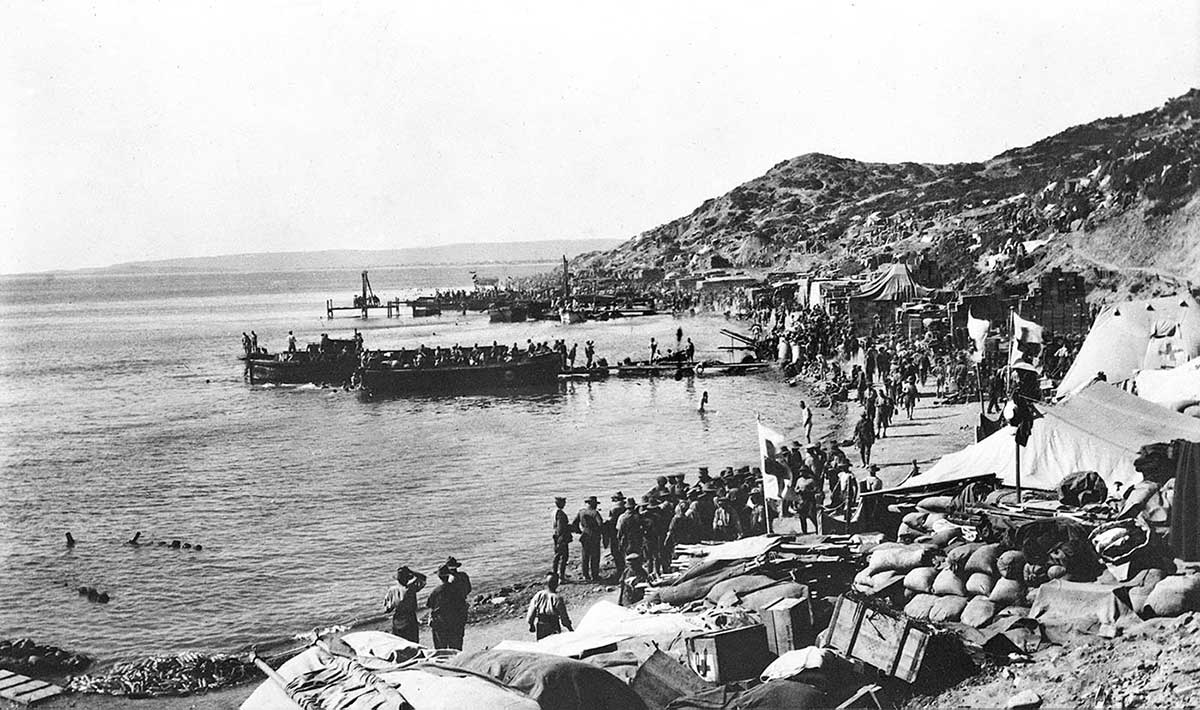
As one of the generation who had demonstrated ardently against the Vietnam War, he did not want to hear the glory stories.
In fact, to Alex’s surprise, he discovered there was no one on Earth more anti-war than a returned soldier. They marched in memory of their friends and comrades who had fallen in blood spattered agony into the mud and sands of foreign lands. They marched in utter sadness, out of respect for their fallen comrades, and each year, after the march, they got hopelessly drunk, maudlin and sentimental, made black jokes and were glad to see their surviving mates; and then were driven home in taxis, back into the fabric of their lives for another year.
They did not march in defence of or out of respect for those who had sent them to die. They did not march in glorification of war.
Old foot soldiers, without a single exception that Alex ever found, had no respect for the senior military staff who so arrogantly sent them to their deaths, no fond memories of battle, no illusions of the glory and rightness of war; nothing but an enduring, terrible sense of grief and loss.
And above all they had no respect for the politicians who had used their youthful enthusiasms for their country to send them to war; as politicians continued to do in the 21st Century.
In 2015, the same Australian political caste who had sent soldiers into conflicts spanning more than a century, including both World Wars and the Vietnam War, eulogised the legend of the Anzacs in ceremony after ceremony to mark the centenary of the Gallipoli Day massacres.
Those politicians who made such hay out of Anzac Day had never put their own lives on the line, never seen the smashed bodies of their friends falling into blood stained mud, never endured the repeated strains of military incompetence, had never been prepared to die for their country.
All they had ever been prepared to do was send others; and then to glorify their deaths as honourable.
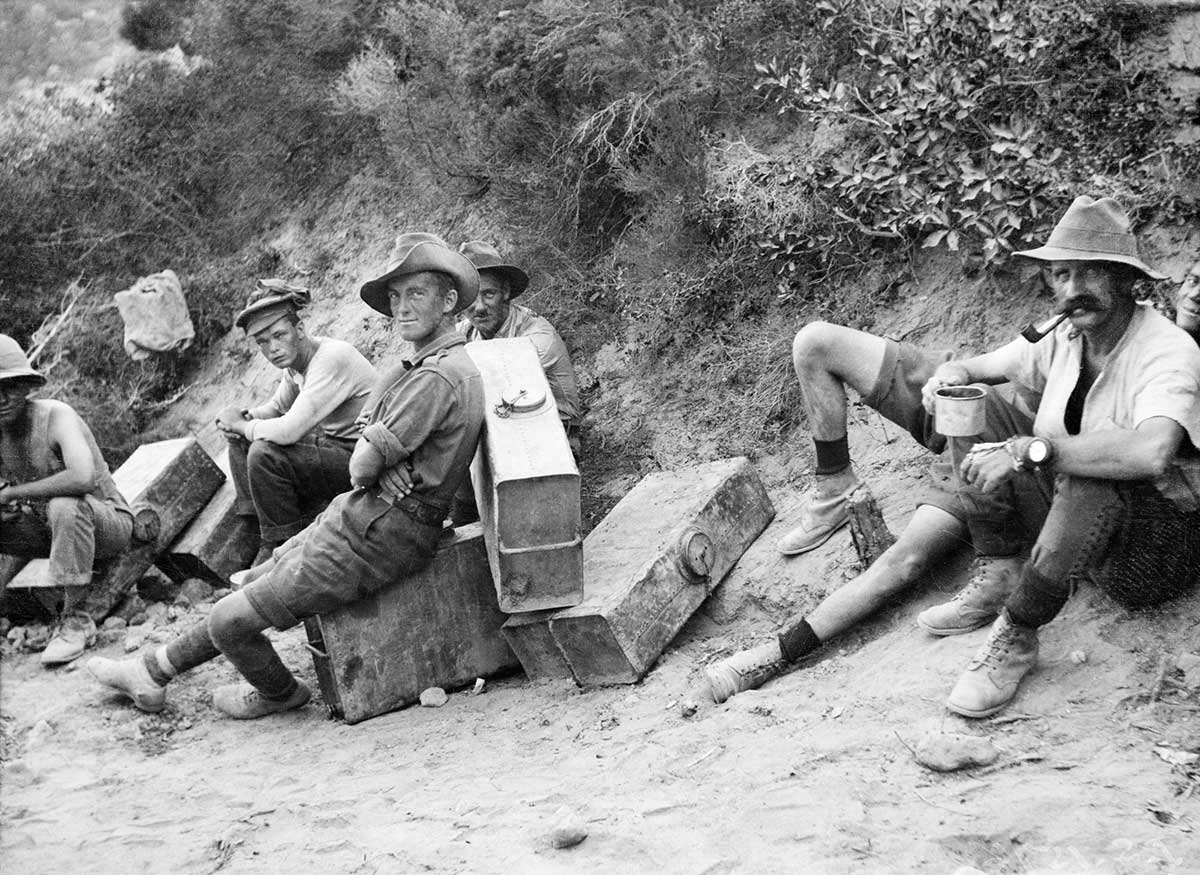
Australia’s total population at the time was about 4 million, and the 416,809 who enlisted for service represent 38.7 per cent of the total male population aged between 18 and 44. Of these, an estimated 58,961 died, 166,811 were wounded, 4098 went missing or were made prisoners of war, and 87,865 suffered sickness.
At Gallipoli alone there had been 8,709 Australian casualties; and another 1,358 from New Zealand.
The attempted invasion of Gallipoli was a military disaster coordinated from London with great discredit to the military leaders involved; but for Anglo-Saxon Australians, it had come to represent the forging of the national spirit, tough and cheerful in the face of adversity, self reliant, loyal to their comrades, determined to make the most of whatever dire circumstance the overlords dealt up to them, willing to make sacrifices for others and for their country.
Until 2015 Anzac Day singularly brought home the shock of the new to the body politic the day had been regarded as a day which brought the country together.
Many members of the ethnic groupings who had been encouraged to settle in the country since those early wars had no relationship to Anzac Day, and saw it as little more than one of the quaint customs of their adopted country.
Muslims had in recent years died fighting the military aggression of Western governments in places like Iraq, Syria, and Afghanistan were not similarly honoured. They saw Anzac Day as an offensive celebration of the invasion of the last caliphate, the Ottoman Empire.
The Anzac Day of 2015 would be different to any preceding year.
For a start, it was the anniversary of the Gallipoli conflict and the founding of the Anzac tradition; and as such was the subject of numerous national ceremonies; while the Prime Minister himself would travel to Gallipoli for the Dawn Service.
The Day was marked in ceremonies large and small, from neglected country town parks, to the grander ceremonies at war memorials in Sydney, Canberra and Melbourne.
But a day which was intended to bring the nation together highlighted instead its fundamental divisions.

A spokesman for the Muslim group Hizb ut-Tahrir said Muslims should not celebrate Anzac day because it was a “superficial, jingoistic” date that marked Australian colonial aggression against the Muslim world, an act it was now repeating with its invasion of Muslim lands in modern day Syria and Iraq.
In a press release issued to coincide with Anzac Day, the Hizb observed: “Anzac Day is commemorated with increasing fervour each year in Australia. The Australian Government goes out of its way to keep the ‘Anzac spirit’ alive. It seeks to impress the Anzac tradition as symbolic of the ‘national character’ of Australia and to impose the Anzac history and concept on everyone, including Muslims living in Australia, as a universal Australian value.”
Hizb ut-Tahrir Australia claimed the true legacy of the Anzac tradition was Australian involvement in the unjust invasions of Iraq and Afghanistan. Just as Australian troops were used for British imperial designs in WWI, so too were they used in Iraq and Afghanistan for American imperial and economic interests. The false pretext in both cases was the spurious claim of “fighting for our freedom,” as if freedom could be
predicated on the oppression of others.
“The truth is that Australia, as a former British colony in the past, and a modern independent sovereign state today, supports an international framework of deceit, exploitation and destruction led by the US and European powers. It is this ugly reality that is covered by superficial jingoistic celebrations based on crafted mythologies like the ‘Anzac legend.’
“From the Muslim perspective, the Gallipoli campaign represents an aggression by Allied troops against the legitimate Islamic authority of the time, the Ottoman Caliphate. There is nothing for Muslims to celebrate about Australian’s contribution to colonial aggression against the Muslim world.
“In the post- 9/11 and 7/7 context, the Government has impressed upon Islamic schools in Australia to introduce Anzac day commemorational activities. This is an imposition of foreign values and a foreign history on Muslims that is unacceptable. Will our children, in the near future, be made to observe one-minute silence and by lectured about the ‘feats’ of Australian troops in Iraq and Afghanistan too?
“We urge the people of Australia to rise above the lowliness of nationalistic sentiment to the higher plane of intellectual inquiry and to think deeply about the reality of Australian participation in war abroad, past and present. There are worthier ends than to live off the oppression of peoples abroad and worthier means than sacrificing the sons of this country at the altar of the economic and political interests of foreign powers like the United States and United Kingdom.”
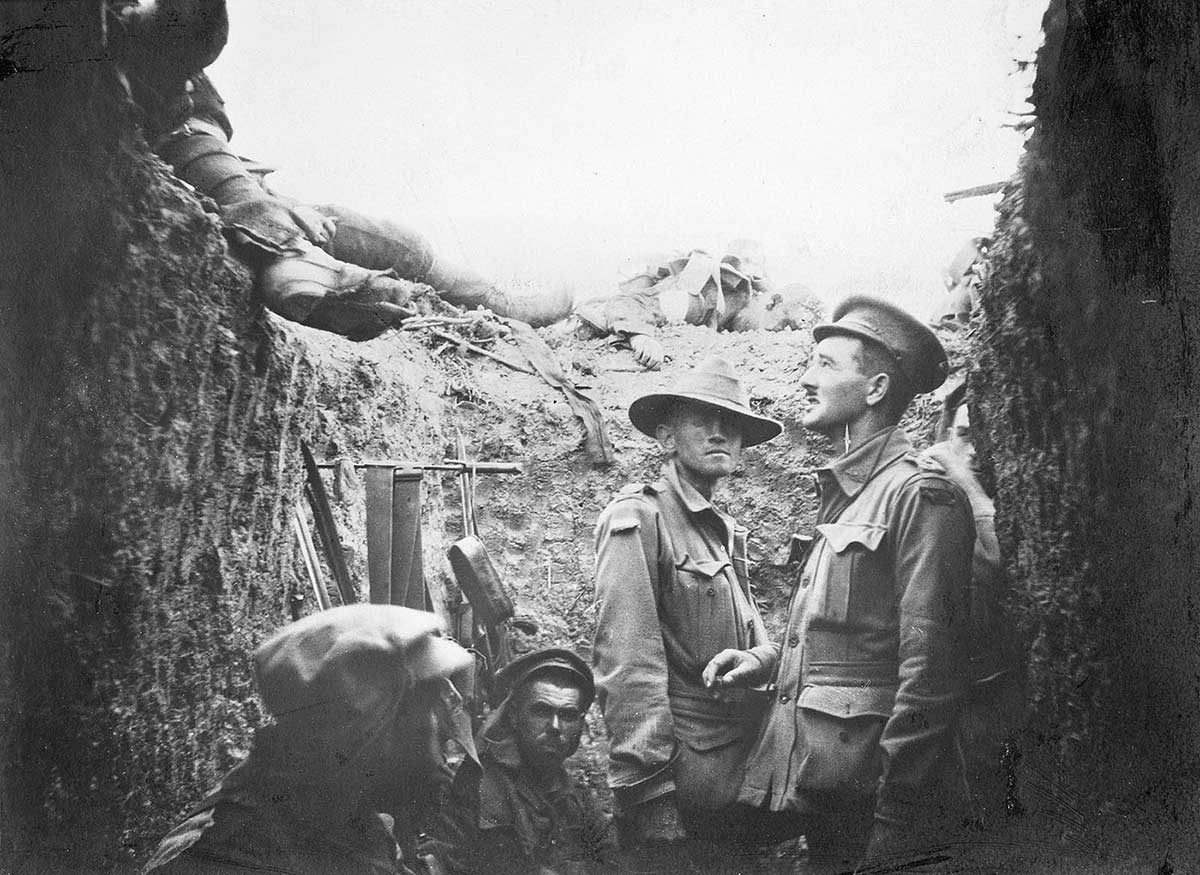
On April 20, 2015, a female Australian Islamic State (ISIS) member using the Twitter handle Umm Abdullatif, the wife of Mahmoud Abdullatif, urged ISIS supporters in Australia to carry on with plans for an attack on Australian soil set for Saturday: “To the Muslims in Australia we say; CONTINUE what the brothers planned for Anzac Day. And your reward will be with Allah.”
Melbourne man Mahmoud Abdullatif, described as a “party boy turned Muslim extremist,” was reportedly killed in Syria in January of 2015. He had arrived in Raqqa around September of 2014 and immediately began sharing pictures of himself holding weapons. He came to the attention of Australian authorities after issuing calls for attacks against disbelievers in Australia.
His wife, previously known as Zehra Duman, had flown to Syria to marry him in December. She was 21-years-old; and received a gun as part of her dowry. She claimed that her husband was now a “green bird,” another term for martyr. She tweeted: “Till we reunite in Jannatul Firdaws my dearest husband. You won the race! Heart of a green bird insha’Allah habibi.”
After his death his Australian jihad bride taunted authorities by telling them to “catch me if you can.”
Another of Umm Abdullatif’s tweets declared: “Yous can say what all you want, but I know my husband is in Jannah bihnillah. Remember our dead are in Paradise, your dead are in hell fire.”
To a critic she said: “I can’t hear you through all these ISIS victories.” Another of her tweets declared: “The kuffar think that death to a Mujahid is a loss. NO, by Allah, martyrdom is a major reward and an honour! We will have victory either way.”
Umm Abdullatif also used her Twitter account to encourage other jihad brides with comments like “The sunset here… it is something you need to see with your own eyes” and “Oh Muslims in the west, you are in great loss if you do not migrate.”
One of Abdullatif last posts read: “I got married today, alhumdolileh I made hijra and got married here man, insha Allah I receive a beautiful death as well.”

Continue what the brothers planned.
Exactly what was planned, if successful, might well have changed Australia forever. In Melbourne there was a spate of arrests as a plot to disrupt the Anzac Day March was uncovered.
Operation Rising, as it was so appropriately known, the Rising of Islam, resulted in the execution of seven search warrants in the South Eastern Metropolitan area of Melbourne, and the arrest of five men in pre-dawn raids across Melbourne.
Part of their alleged planning included targeting an ANZAC day ceremony. The men were alleged to be undertaking preparations for planning terrorist acts in Melbourne, including beheading a police officer, stealing his weapon and then committing acts of violence.
Four of the men were 18 years old, the fifth 19 years old. Those arrested regularly attended the Al-Furqan Centre in Springvale South, subsequently shut down for promoting extremist ideas. Senior Islamic State recruiter
Neil Prakash, one of Australia’s most infamous and influential jihadists, had also once been a regular.
The young men were associates of Numan Haider, the teenager who had died the previous September after stabbing two police officers in front of a police station. Some of those arrested in pre-dawn counter terrorism raids were with Haider before he attacked two officers with a knife outside the Endeavour Hills police station.
The Anzac Day attack plot allegedly involved killing a police officer and then using the officer’s gun to go on a shooting rampage until the perpetrators themselves were killed. The plot was partly to seek revenge for Haider’s death.
Police had originally become concerned that the men, whose passports had been cancelled, as had Haider’s, frustrated in their desire to practice jihad in the Middle East, would turn their jihadi zeal towards Australians. Their fears were heightened by the emergence of a propaganda video in which Prakash praised Haider’s efforts.
Critics argued that the Australian government policy of confiscating passports of would-be jihadists was creating an increasing number of people with nowhere to go but home soil to fulfil what they saw as their religious obligation to practice jihad.

Sydney Muslim doctor and community leader Jamal Rifi said confiscating passports without any backup programs was nonsensical, leaving ticking time bombs in the community.
Dr Rifi, named as Australian of the Year by The Australian newspaper, warned: “All this does is keep these individuals in the local community. They’re given a badge of honour to parade and thus in turn creating for them a fan base, without the availability for any pathways or programs for re-education.
“They have confiscated large numbers of passports. Some of them are already overseas, but in our area of Sydney there are at least 15 people roaming the streets who have had their passports taken away.
“The type of people whose passports have been confiscated have been roaming the street and they are forming a fan base around them, taking the high moral ground, using intimidation strategies, and no one is engaging with them.
“It is a badge of honour for them. Their passport has been taken because they are a national security risk, but at the same time they pose a personal and family security risk to me. If they are so willing to go and help whom they call the oppressed people in Syria, give them their passport and I’ll buy them a one-way ticket. Let them go.”
Dr Rifi received death threats for his comments criticising Islamic State and condemning
one Australian jihadi posing with severed heads.
An offer of a $1,000 was made for the supply of his home address. He was forced to step up security at both his home and surgery.
Former Immigration Minister Scott Morrison described as brave comments by Dr Rifi which could carry real consequences in the community.
So much for freedom of speech in a great pluralistic liberal democracy.
Former counter-terrorism officer Peter Moroney said cancelling the passports of radicals without any community back up measures was like “pulling the pin on a hand grenade and leaving it in a confined space.”
Wissam Haddad, owner of the hardline Al-Risalah prayer centre in Bankstown said would-be jihadists should be allowed to leave the country and revoke their citizenship.
“You can’t put a wild bird in a cage and just hope it’s going to be domesticated,” he said.
“Cancelling passports is not going to deter anyone from jihad. You can’t kill an idea.”
The two 18 year old youths retained in custody were Sevdet Ramden Besim and Harun
Causevic.
In documents tendered in the Melbourne Magistrates Court police alleged Besim had been advised to practice decapitation on a “lonely person.”
Besim allegedly received coaching on executing a terror attack from a 14-year-old British boy, and planned to sacrifice his life to fight the enemies of Allah.
Australian Federal Police agent Denis Scott told the court the 14-year-old, who also faced terror charges, wanted to attack on Anzac Day for maximum exposure.
In online conversations with the UK teen conducted through an encrypted program, Besim allegedly said he was thinking “a combo of knife and car” should be used in an Australian attack. When Besim indicated he had access to a machete, the 14-year-old allegedly responded: “Sharpen that as hard as you can, then run police over and decapitate.”
Besim allegedly replied: “That sounds like a plan.”

The UK teen said Besim should break into a house to get his first taste of a beheading, a few hours before the operation.
“im (sic) talking a proper lonely person,” the UK teen allegedly said.
Besim and Causevic had allegedly researched parade routes and possessed copies of a pledge of allegiance to the leader of Islamic State.
“25th is a good day coz its anzac day and this will mean they will remember this on that day every yr after,” Besim allegedly told the UK teen.
“I can’t wait now for the op. Like i said though id love to take out some cops … I was gonna meet with them then take some heads ahaha.”
Another teen, Mehran Azami, 19, of Narre Warren, faced more than 20 weapons charges.
That there was no repentance was everywhere clear.
At a bail hearing Vehid Causevic’s father claimed his son was innocent and had been the victim of a political conspiracy: “This is everything set up from government, from Prime Minister. This is political. This is message from Prime Minister to young Muslim go five times a day to mosque, be charged like terrorist. My son doesn’t understand Islam, but he doesn’t do nothing. If you find anyone in this country to say my son has done something bad I go in jail for all my life.”
The court had earlier heard evidence that after a minor collision in a car park, his son had allegedly told the other driver: “Australia is shit and ISIS is going to kill this country.”
Practice beheading on a lonely person.
On April 21, 2015, four days before Anzac Day, the Islamic State via its official media arm Al-Hayat, released a video featuring Abu Khaled Al-Cambodi, 23, an Australian ISIS fighter of Cambodian origin.
Al-Cambodi, formerly known as Neil Prakash, travelled to Syria from Melbourne in early 2013.
He was a former Buddhist who became Islamic State’s senior recruiter in Australia. Prakash provided an account of how he entered Islam and called for lone wolf attacks in Australia.
Al-Cambodi praised the terrorist attacks which had occurred in Australia in recent months, and called on Australian Muslims to join forces with ISIS and kill the disbelievers in their country. “You kill him [for] Allah has promised you a place in Paradise,” he said. “Now Is The Time To Rise… Now Is The Time To Rush For That Reward That Allah Has Promised You.”
In the 12-minute video, professionally produced and promoted by Islamic State, Prakash issued a call to arms to his “my brothers, my beloved brothers in Islam in Australia. Now is the time to rise, now is the time to wake up … You must start attacking before they attack you.
“Look how much [sic] of your sisters have been violated. All I hear on the news in Australia is this sister was hurt … her hijab was ripped off. But no, you see the brothers sitting.
“I ask you brothers, when are you going to to rise up and attack them, for them attacking you?
“I invite the Muslims to come here. I tell you that this is the land of life.
“The media has portrayed that we come here because we were social outcasts, because we had nobody we had to turn to Islam, because we were just trouble-makers in the past. This is far from the reality. We see people from all walks of life here.”
As part of the promotion Al-Cambodi was featured in the April 2014 issue of the ISIS English-language magazine Dabiq.
Under a prominent picture , the Forward quoted “Allah’s messenger,” the infamous Al- Qaeda fighter Abu Mus’ab az-Zarqawi, declaring: “We perform jihad so that Allah’s word becomes supreme and that the religion becomes completely for Allah. Everyone who opposes this goal or stands in the path of this goal is an enemy for us and a target for our swords, whatever his name may be and whatever his lineage may be.”
The Forward also quoted Abu Bakr al-Baghdadi: “O Muslims everywhere, glad tidings to you and expect good. Raise your heads high, for today – by Allah’s grace – you have a state and khilafah, which will return your dignity, might, rights, and leadership. It is a state where the Arab and non-Arab, the white man and black man, the easterner and westerner are all brothers. It is a khilafah that gathered the Caucasian, Indian, Chinese, Shami, Iraqi, Yemeni, Egyptian, Maghribi (North African), American, French, German, and Australian. Allah brought their hearts together, and thus, they became brothers by His grace, loving each other for the sake of Allah, standing in a single trench, defending and guarding each other, and sacrificing themselves for one another.
“Their blood mixed and became one, under a single flag and goal, in one pavilion, enjoying this blessing, the blessing of faithful brotherhood. If kings were to taste this blessing, they would abandon their kingdoms and fight over this grace. All praise and thanks are due to Allah. Therefore, rush O Muslims to your state. Yes, it is your state.
“Rush, because Syria is not for the Syrians and Iraq is not for the Iraqis. The Earth is Allah’s. The State is a state for all Muslims. The land is for the Muslims, all the Muslims.”
The next month Prakash wrought havoc on travel in the Middle East, forcing three major airlines to ground planes after a bomb hoax.
Etihad, Lufthansa and Turkish Airlines all had flights from Turkey and Egypt diverted or turned back after Prakash falsely claimed on social media that bombs had been placed on two planes. The two flights he mentioned were Etihad’s EY650 from Cairo to Abu Dhabi and “IST 1305.”
IST is the code for Istanbul’s international airport. Both Lufthansa and Turkish Airlines had flights numbered 1305 departing from that airport, and both were turned back shortly after departure. More than 450 passengers were directly affected, with delays at airports affecting many more.
Speaking in Paris Australian Foreign Minister Julie Bishop said there would be an unprecedented level of security at Anzac Day ceremonies across Europe in the wake of terror threats.
“I’m aware that terrorist attacks can take place at any place and any time,” she said.
The countries hosting Anzac services, including the UK, Belgium, France and Turkey, were very conscious of the need to keep people safe, she said. “There will be an unprecedented level of security across the globe for events such as this,” she said. “Just as we do in Australia countries are doing that likewise overseas and those who are hosting Anzac ceremonies and similar ceremonies are taking steps to ensure that the security is appropriate.
“We will have representatives in London … and I’m assured that the security will be as
appropriate as it can be, as it will be here in France and in Belgium.”
Australian National University terrorism expert Clarke Jones said Anzac Day services were a “high risk” for terrorism threats: “It is a valuable target and it would be quite strategic for, say, Islamic State to launch something in Turkey. Gallipoli is a fair distance from the border of Syria and Iraq but distance is not big deal if they wanted to do it, especially given the porous border.”
The 8000 Australians who had received tickets to the Dawn Service went through rigorous security screening before the event, six checks in all. There were some 4,000 Turkish police and paramilitary officers on duty. ASIO and Australian Federal Police also travelled to Gallipoli to assist with security arrangements.
THE SERIES OF BOOKS OF CONTEMPORARY AUSTRALIAN HISTORY BEGINNING IN 2015

